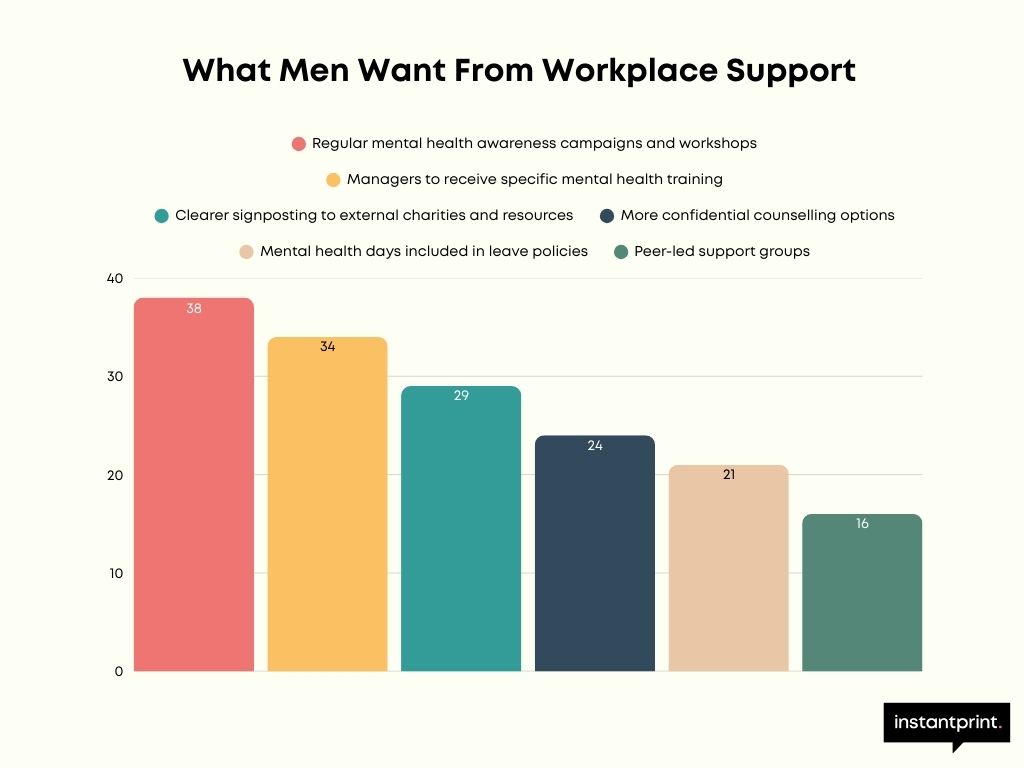One in three (33%) men say their workplace offers no mental health support, according to new research. A study by instantprint, which surveyed 2,000 UK office staff, found that male employees are significantly more likely than female colleagues to feel unsupported when it comes to mental health at work. Among men aged 25-34, the proportion rises to 42%, suggesting that younger men are the most at risk of slipping through the cracks when it comes to workplace wellbeing provision. The findings highlight a growing workplace wellbeing gap, with male employees still far more likely to suffer in silence. According to the research, 60% of men have hidden mental health struggles from their employer, and of those, 68% feared being seen as weak, 54% worried it would impact their career progression, and 39% believed it would change how colleagues treated them.
The Hidden Cost of Silence
While public conversations about mental health have expanded in recent years, workplace culture has not caught up for many men. More than one in four (27%) respondents said their workplace provides some support but that it is not actively promoted, while a further 15% said resources exist but are difficult to access. Only 12% of men surveyed felt “completely supported” at work, and 9% went as far as to say their organisation makes it harder to address mental health concerns. A small proportion (4%) said they were unsure what, if any, support is available.
This lack of visible, accessible support has consequences for both individuals and businesses. According to the Office for National Statistics, poor mental health costs UK employers up to £12 billion annually in absenteeism, with presenteeism, turning up to work while unwell, causing even greater productivity losses. For male employees, cultural stigma and fear of judgement often mean they reach breaking point before seeking help.
What Men Want From Workplace Support
When asked which changes would make the biggest difference, male employees highlighted a clear set of priorities.
- 38% want regular mental health awareness campaigns and workshops
- 34% want managers to receive specific mental health training
- 29% want clearer signposting to external charities and resources
- 24% want more confidential counselling options
- 21% want mental health days included in leave policies
- 16% want peer-led support groups

Awareness of external resources is also low. Only 19% of men have heard of Andy’s Man Club through their workplace, 14% have been signposted to Samaritans, 11% have been made aware of Mind via internal communications, and just 8% have been informed about industry-specific charities such as the British Printing Charity.
Expert Insight: Why Visibility Is Key
Vicki Russell, Head of TX (HR) at instantprint, says that support is only as good as its visibility and accessibility:
“Many men in the workplace are silently struggling, not because support doesn’t exist, but because it’s hidden or framed in ways that don’t feel approachable. It’s not enough to have an Employee Assistance Programme buried on an intranet page — it needs to be visible, normalised and encouraged at every level.”
Russell believes that companies need to take a proactive approach to communication, ensuring employees know where and how to get help. She points to three essential steps:
1. Normalise the Conversation — Leaders and managers should talk openly about mental health, sharing their own experiences to help reduce stigma.
2. Signpost Regularly — Make resources such as Andy’s Man Club, Samaritans (116 123), and Mind highly visible in emails, posters, and induction materials.
3. Offer External, Confidential Support — Partner with industry-specific charities, such as the British Printing Charity, to provide independent help that bypasses workplace hierarchies.
Putting It Into Practice
At instantprint, support goes beyond an HR policy. The company’s partnership with the British Printing Charity gives employees direct access to trained counsellors, financial assistance during hardship, and advice on personal challenges — all without needing to approach a manager first. This confidentiality is particularly important for male employees who may otherwise feel reluctant to come forward.
The business also actively promotes external resources, from Andy’s Man Club to national helplines, ensuring these are not just “nice-to-have” add-ons but a visible part of day-to-day workplace culture.
A Call for Consistent Action
The message from male employees is clear: they want mental health support that is visible, approachable, and embedded into workplace life. Employers who fail to deliver risk not only the wellbeing of their people but also the productivity and stability of their business.
By normalising conversations, training managers, and making resources easy to find, companies can create an environment where men feel safe to speak up — and where mental health is treated as a core part of workplace wellbeing, not a hidden benefit.


.jpg)


